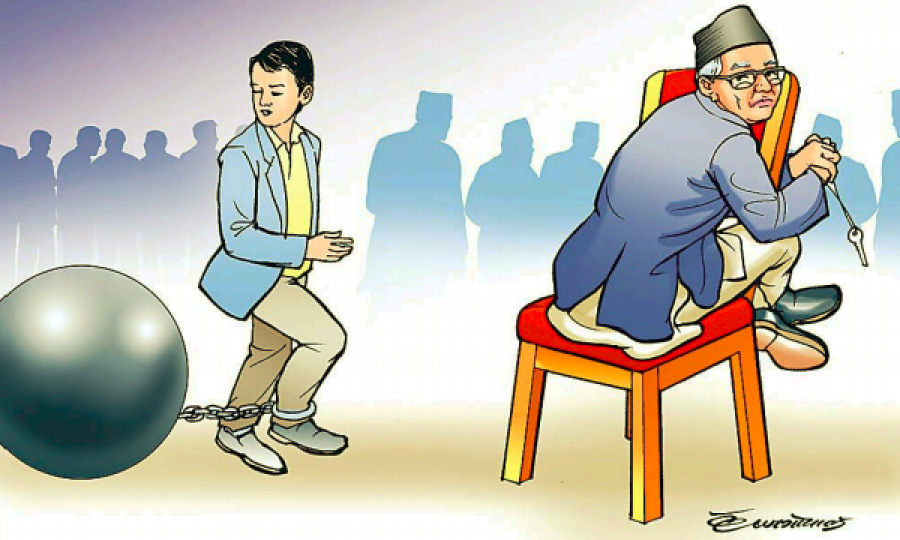Politics
Will generational change in party leaderships be for the better? Experts aren’t optimistic.
Politicians have made a career of politics rather than having the intention to serve the people and therefore it is the value system in politics that needs to change, they say.
Binod Ghimire
Both of Nepal’s established parties—Nepal Communist Party and Nepali Congress—are in the mess of their own making.
While it is one chair KP Sharma Oli versus the other chair Pushpa Kamal Dahal in the ruling party, it is President Sher Bahadur Deuba versus his long time rival Ram Chandra Poudel in the main opposition party.
At times, when the party leadership is unable to come out of a quagmire, there is often a demand for the transfer of leadership to the next generation. At the moment this demand may be stronger in the opposition which lost miserably in the 2017 general elections.
Meanwhile, the ruling Nepal Communist Party (NCP) is so beset with wranglings within that governance has taken a terrible hit.
But experts believe that even if a younger generation were to be given the reins, politics would not change much.
“I don’t expect changes from the younger generation that gets the leadership by the grace of the older generation,” said Sanjeev Pokharel, an anthropologist who writes political commentaries.
Whether the top is bestowed with that grace is a different matter.
Prime Minister KP Sharma Oli, when asked at a recent television programme about the handover of power to a younger generation of leaders, said leadership transfer was possible to the crop of politicians in their 60s. Oli is 68 years old and has had two kidney transplants. The next general elections are due in two years.
Experts say while the transfer of the leadership is always a welcome move, that alone cannot be a determinant factor in bringing about the changes in the political scenario that the country desperately needs.
“The major question today is how and with which value system a party functions,” he said. “If the party functions in the current fashion, there will be no change no matter which generation takes its leadership.”
In their functioning, both the Nepali Congress and the Nepal Communist Party have been corrupt, opaque in decision making, and have failed to live up to the people’s aspirations as it has been evident again and again.
The inability of the government to check the spread of the Covid-19 contagion and the utter lack of a strategy to contain it is a prime example of the lack of vision among leaders, political analysts say.
As of Friday, there are 206,353 cases of the coronavirus and 1,202 deaths. The number of positive cases doubled in September and again in October.
“The problem with Nepali politics is that we don’t have visionary and committed leadership,” said Rajendra Maharjan, a political analyst who writes a column in Kantipur, the Post’s sister publication.
But the younger generation is no different.
Tourism Minister Yogesh Bhattarai, for example, was well known for his leadership qualities when he was in student politics.
When his party formed the government in early 2018 and he was not given a ministerial berth, he often criticised the wrongdoings of the party leadership.
In July last year he was made the tourism minister. Soon he followed the ways of Prime Minister KP Sharma Oli in making disparaging, derogatory and contemptuous remarks against dissenters.
“The majority of the next and young generation leaders in Nepali politics isn’t any different from the current leadership,” said Maharjan. “There have been several instances when the second and third rung leaders, who otherwise looked promising, haven’t been different from their party boss when they get to the leadership.”
Pokharel the anthropologist is even more blunt in his assessment.
“The next and younger generations in the Nepal Communist Party are as incompetent and corrupt as the older generation,” said Pokharel on Whatsapp from Pakistan where he is currently based.
Experts say developing a value-based party system which functions on principles is what Nepal needs at this point. They say the second and third rung leaders in Nepali politics might have talked about changing the party leadership but they have seldom raised their voices for developing a system within the party.
The problem, according to Chandra Dev Bhatta, a political commentator who often writes in Kantipur, is that leaders have taken politics as a career.
“The problem with Nepali politics is it is not a part of voluntarism, it is a profession,” Bhatta said. “We cannot expect any changes, even if the leadership comes to the third generation, if the culture is not changed.”
Despite his doubts, Bhatta said he would like to see the older generation hand over power to the younger generation.
But he believes it is necessary to teach the upcoming generation about the political philosophy that politics is voluntary and its main motive is to serve the people.




 19.12°C Kathmandu
19.12°C Kathmandu















